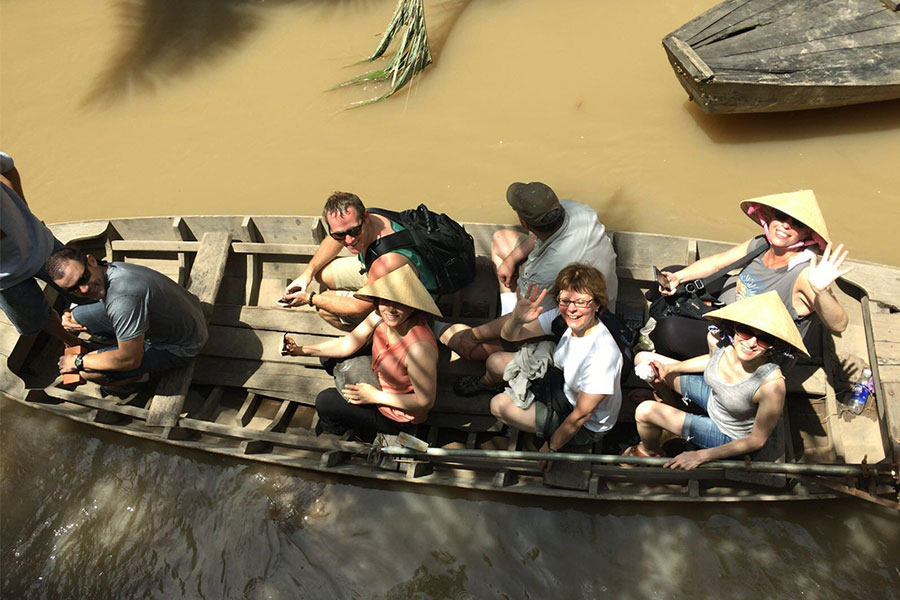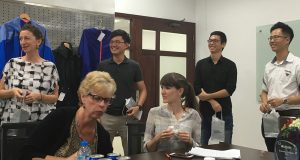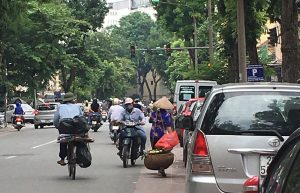EMBA international immersion in Viet Nam: Day 1
Columbia, Olam, and expats

On the first official day of the program, we met with Columbia and Olam. While the idea is to visit a wide variety of organizations to see differences and how they deal with challenges, it seemed that each day ended up having an unintended theme. Today’s theme was expats.
 Our first meeting was with Columbia, but because of how Columbia is structured in Viet Nam that meant we actually met with one of their partners, Promax. The expat who worked for Columbia road with us on the bus to and from the meeting where we got to hear her experience of being an expat. She shared with us what she has done in her career, her passion for wanting to work in Viet Nam, and some of the challenges she faced from being a woman to dealing with political challenges to what it is like to actually take an expat position.
Our first meeting was with Columbia, but because of how Columbia is structured in Viet Nam that meant we actually met with one of their partners, Promax. The expat who worked for Columbia road with us on the bus to and from the meeting where we got to hear her experience of being an expat. She shared with us what she has done in her career, her passion for wanting to work in Viet Nam, and some of the challenges she faced from being a woman to dealing with political challenges to what it is like to actually take an expat position.
Alex Draper is a part of my cohort. He is the Vice President of Global Marketing at K2 Sports, and has spent most of his career working with factories. Because of this, I asked him for his input on the tour:
“The visit with the head of Columbia Sportswear’s Asian sourcing was of particular interest to me. I work for K2 Sports in similar winter sporting goods categories and wanted to compare notes on some of the challenges faced in this industry. It was interesting to hear how Columbia is trying to level load each factory with spring and fall production in order to avoid the waste created by a period of time where the factory is operating below capacity expectations. Also, that when they can’t achieve a spring/fall balance, they allow the factories to build ahead on certain items to create a more level capacity load while having the factory finance the cost of holding the product until Columbia is read to ship. Columbia, like K2 Sports, participates in open dialogue with competing brands with regards to social compliance standards required for the factories and asserts that theirs’ are the strongest. In reality, every company has a slightly different policy, feels theirs is the strongest, and requires lengthy audits of each factory. The end result is positive, but the process is highly inefficient. It became clear to me on this visit that creating a “gold standard” for social compliance that exceeds an amalgam of the strictest standards and following through with a routine of trustworthy third-party audits would be a much more efficient system. That is easier said than done, but it seems like the natural progression for this relatively immature process.”

After lunch we met with the expat from Olam, a major global food ingredients company with significant operations in Viet Nam in coffee, cashews, and spices. He couldn’t have been more different from what we had seen in the morning. He was very targeted and specific on who Olam is, what they do, how they do it, and the challenges it faces. At the end of the presentation he also shared his career history and experience of being an expat. My favorite quote that he used is. “You need to embrace the culture. The culture won’t reach out and embrace you.”
Dan Smith is a part of the Regional program, and he actually works in the same industry that Olam does. He is the Director of Operations & Procurement at AMES International, a manufacturer for chocolate and nuts in Seattle, WA and Kerala, India, so I had asked him to share his thoughts on the presentation:
For the past twelve years, having worked in several of the business segments Olam supplies, I have a good understanding of Olam’s impact on my business segment. Here are few of the key takeaways for the meeting:
- Olam created a business model that revolved around identifying obscure commodities in demanding developing countries and procuring them for large multinational food manufactures. This should open everyone’s eyes that not every great new business plan is an IT startup or a medical device. Who knew that sourcing cotton in Nigeria would lead to a 10-Billion-dollar company in 30 years!
- Company culture – Key leadership has all worked through the ranks in these developing nations. In doing so, they have come to understand what it takes to get work done in difficult environment.
- Social responsibility – large multinational retailer requires raw materials that are traceable, do not use child labor, and provide commodities at a sustainable price. Olam provides these value added services to their customers. This is becoming ever more important for food safety and security around the world.”
Guest post by Melanie DePaoli
Speaker | Brand Catalyst, Omicle LLC
Follow Melanie on Twitter: @MelDePaoli
